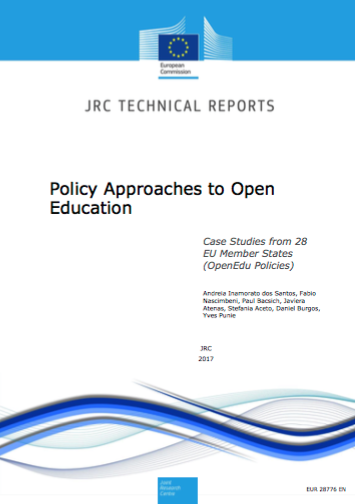OpenEdu Policies reports – JRC Research Centre
Javiera Atenas - January 15, 2018 in communication, featured, oer, Open Policies
By Paul Bacsich Co-coordinator and policy lead of the Open Education Working Group
—
Hot off the press: OpenEdu Policies reports . These reports are the final outcome of one and a half intense years of research into open education policies involving many stakeholders, particularly ministries of education, research and science across Europe. ‘Going Open’ is a report bringing policy recommendations on open education at regional, national and EU levels. ‘Policy Approaches to open education’ is a report covering the 28 EU Member States, presenting case studies about how each country approaches open education policies. Both reports are part of the JRC’s OpenEdu Policies project –
 The Joint Research Centre of the European Commission has just published a comprehensive overview report (164 pages) on Policy Approaches to Open Education across all of the 28 EU Member States.
The Joint Research Centre of the European Commission has just published a comprehensive overview report (164 pages) on Policy Approaches to Open Education across all of the 28 EU Member States.
The Foreword to the report, by Yves Punie (Deputy Head of Unit DG JRC Unit Human Capital and Employment) summarises the conclusions as follows: “The diversity of polices and approaches presented herein reflect the diversity that is intrinsic to the European Union. Each Member State has specific goals for education and priority areas to address when formulating its policies. However, this research shows that Member States are aware of open education issues and that in one way or another nearly all of them have implemented some sort of initiative or action plan in relation to open education, even though that goal is not explicit in some cases.” He goes on to describe the report as “another step taken by the European Commission (DG EAC and JRC) to meet Members States’ requirements for more research and evidence on open education in support of policy-making in Europe.”
The work for the overview report was carried out by the European Commission’s Joint Research Centre (JRC) in collaboration with the Research Institute for Innovation & Technology in Education (UNIR iTED) at the Universidad Internacional de la Rioja (UNIR) in Logroño, Spain. An international team based in Spain (Daniel Burgos), Italy (Fabio Nascimbeni and Stefania Aceto) and the UK (Javiera Atenas and Paul Bacsich) carried out the work, with assistance from 28 ministry officials and other experts who agreed to be interviewed. The interview work was supported by substantial desk research across all Member States, for which a further large number of experts on open education were consulted, along with outputs from key projects such as OER World Map, OERup!, D-TRANSFORM, ADOERUP (for the European Parliament), POERUP and earlier JRC projects and reports on open education. In particular all identified policies were analysed using the OpenEdu Framework produced by JRC, which identifies six core dimensions of open education (Access, Content, Pedagogy, Recognition, Collaboration and Research) and four transversal dimensions (Strategy, Technology, Quality, Leadership). The report is available at https://ec.europa.eu/jrc/en/publication/policy-approaches-open-education-case-studies-28-eu-member-states-openedu-policies
The report, together with additional research and expert consultations, forms the basis for the also just released JRC report “Going Open: Policy Recommendations on Open Education in Europe (OpenEdu Policies)”, which highlights policy options to further open up education in Europe. See https://ec.europa.eu/jrc/en/publication/eur-scientific-and-technical-research-reports/going-open-policy-recommendations-open-education-europe-openedu-policies

Our long report is, we believe, the first one of its kind to bring together at a detailed level policy work in open education for a complete geopolitical region. The team will be happy to explain the methodology to other interested research groups. We can see no reason why the approach, including use of the OpenEdu Framework for analysis, cannot be replicated for other geopolitical groupings such as Latin America, Asia-Pacific, Commonwealth of Nations, La Francophonie and more widely across Europe. Regarding the last, it would perhaps be most immediately useful if funding could be found for those countries in the European Economic Area and the European Neighbourhood to carry out similar work.
Inevitably in such a detailed report, there will be items at the Member State level that get rapidly out of date. Indeed, we hope that such reports as this and the overview reports from JRC will foster an increased climate of policy formation and creation of initiatives at MS level, not only at EU level. As part of its ongoing work, the Open Education Working Group will continue to make its email list and blog available to interested researchers and specifically to encourage them to produce similar and updated material for their countries. For more details see https://blog.okfn.org/2017/08/22/the-open-education-working-group-what-do-we-do-and-what-is-coming-up-next/
 Open Education Working Group
Open Education Working Group 


